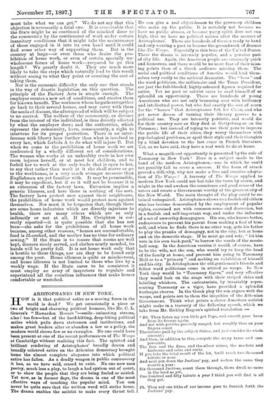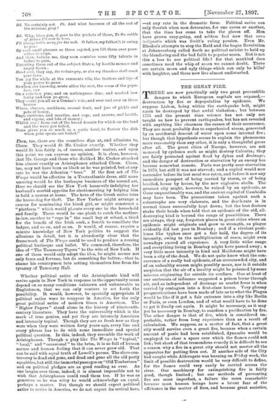ARISTOPHANES IN NEW YORK. H ow is it that political satire
as a moving force in the world is dead ? We get occasionally a piece or two of bright and charming political humour, like Mr. C. L. Graves's " Hawarden Horace "—smile - animating strains, alas ! too few—but of the bard-hitting, deep-biting political satire which pulls down statesmen and institutions, and makes great leaders alter or abandon a law or a policy, the modern world shows few or no examples. No one could have been present at one of the recent performances of The Wasps at Cambridge without realising this fact. The spirited and brilliant rendering of Aristophanes' broadly drawn and broadly coloured satire on the Athenian democracy brought home the almost complete abeyance into which political satire has fallen. As a deadly weapon in public controversy it has, as we have said, ceased to exist. No one now uses poetry, much less a play, to laugh a bad system out of court, or to show the people that they are being fooled or misled. Yet now, as in former days, the drama is one of the most effective ways of touching the popular mind. You can never be quite sure that the written word will strike home. The drama enables the satirist to make every thrust tell. He can give a real object-lesson to the grown-up children who make up the public. It is certainly not because we have no public abuses, or because party spirit does not run high, that we have no political satires after the manner of Aristophanes'. There are hundreds of themes ready to hand and only wanting a poet to become the groundwork of dramas like The Wasps. Especially is this true of the Un'ted States. There the drama is intensely popular, and a genuine part of city life. Again, the American people are extremely quick and humorous, and there would be no more fear of their miss- ing points than of a Greek audience missing them. The social and political conditions of America would lend them- selves very easily to the satirical dramatist. The " boss " and the ward politician, the millionaire and the Trust President, are just the full-blooded, highly-coloured figures required for satire. Yet no poet or satirist cares to avail himself of so splendid an opportunity. There are hundreds of young Americans who are not only brimming over with brilliancy and intellectual power, but who feel exactly the sort of scorn for the " bosses " that Aristophanes felt for Cleon, and who yet never dream of turning their literary powers to a political use. They are intensely patriotic, and would die for their country now as they died at Gettysburg or on the Potomac ; but instead of trying to use their pens to improve the public life of their cities, they worry themselves with psychological problems, or spoil their style and their thoughts by a, blind devotion to the last craze in French literature. Yet, as we have said, they have a real work to do at home.
What a magnificent opportunity is presented by the rule of Tammany in New York ! Here is a subject made to the band of the modern Aristophanes,—one in which he could not possibly fail to score a success. If the form of attack proved a difficulty, why not make a free and creative adapta- tion of The Wasps A travesty of The Wasps applied to modern New York could not but take the town by storm, and might in the end awaken the conscience and good sense of the voters and create a Government worthy of the greatest city of the New World. The main thought of the play could be re- tained unimpaired. Aristophanes shows us a foolish old citizen who has become demoralised by the employment of popular rights, exercised not with common-sense and discretion, but in a foolish and self-important way, and under the influence of a set of unworthy demagogues. His son, who knows better, endeavours to prevent his parent from making a fool of him- self, and when he finds there is no other way, gets his father to play the pranks of demagogy, not in the city, but at home and on the domestic stage. If he must go and vote, "let him vote in his own back-yard," to borrow the words of the music- hall song. In the American version it would, of course, have to be the wife, not the son, who would try to keep the head of the family at home, and prevent him going to Tammany Hall or to a "primary" and making an exhibition of himself and his city. In Aristophanes the old gentleman's friends and fellow ward politicians come in attired as wasps. In New York they would be "Tammany tigers," and very effective they would look on the stage with their striped skins and bristling whiskers. The caricaturists, by invariably repre- senting Tammany as a tiger, have provided a splendid burlesque chorus. In the Greek play the son argues with the wasps, and points out to them the iniquities of the Athenian Government. Think what points a clever American satirist might make in a travesty of the following speech, which we take from Mr. Bickley Rogers's spirited translation :— "Bd. Then listen my own little pet Papa, and smooth your brow from its frowns again.
And not with pebbles precisely ranged, but roughly thus on your fingers count The tribute paid by the subject States, and just consider its whole amount ; And then, in addition to this, compute the many taxes and one- per-cents, The fees and the fines, and the silver mines, the markets and harbours and sales and rents.
If you take the total result of the lot, 'twill reach two thousand talents or near.
And next put down the Justices' pay, and reckon the sums they receive a year:
Six thousand Justices, count them through, there dwell no more in the land as yet, One hundred and fifty talents a year I think you will find is all they get.
Ph. Then not one tithe of our income goes to furnish forth the Justices' pay. Bd. No certainly not. Ph. And what becomes of all the rest of the revenue, pray ?
Bd. Why, bless you, it goes to the pockets of those, To the rabble
of Athens ever be true,
I'll always battle away for the mob. 0 father,myfather,'t is owing to you :
By such small phrases as these cajoled, you lift them over your- selves to reign.
And then, believe me, they soon contrive some fifty talents in bribes to gain, Extorting them out of the subject States, by hostile menace and angry frown :
Eland over, they say, the tribute-pay, or else my thunders shall crash your town.
You joy the while at the remnants vile, the trotters and tips of your power to gnaw.
So when our knowing, acute allies the rest, the scum of the popu- lace, saw
On a vote.box pine, and on nothingness dine, and marked how lanky and lean ye grow, They count you all as a Connas's vote, and ever and ever on these bestow
Wines, cheeses, necklaces, sesame fruit, and jars of pickle and pots of honey. Rags, cushions, and mantles, and cups, and crowns, and health, and vigour, and lots of money ;
Whilst you ! from out of the broad domain for which on the land and the wave you toiled,
None gives you so much as a garlic head, to flavour the dish when your sprats are boiled?'
Then, too, there are the countless digs at, and allusions to, Mon. They would fit Mr. Croker exactly. Whether they would fit him fairly is, of course, another matter, and upon this point we can express no opinion, It is clear, however, that Mr. George and those who disliked Mr. Croker attacked him almost exactly as Aristophanes attacked Cleon. Cleon, too, may not have been as black as he was painted, but at any rate he was the Athenian "boss." If the first act of The Wasps would be effective in a Transatlantic dress, still more amusing would be the burlesque business of the second act. Here we should see the New York housewife indulging her husband's morbid appetite for electioneering by helping him to hold a caucus at home. The hero of the Greek satire tries the house-dog for theft. The New Yorker might arrange a caucus for nominating the hired girl, or might construct a " platform " which would placate every one in the household and family. There would be one plank to catch the mother- in-law, another to "rope in" the small boy at school, a third for the benefit of the Irish cook, a fourth to conciliate the lodger, and so on, and so on. It would, of course, require a minute knowledge of New York politics to suggest the allusions in detail, but it is abundantly clear that the framework of The Wasps could be used to produce a rousing political burlesque and ballet. We commend, therefore, the idea of "The Tammany Tigers" to the wits of New York. If one of them would only adopt the idea, he might secure not only fame and fortune, but do something far better,—that is, shame his countrymen into setting themselves free from the tyranny of Tammany Hall.
Whether political satire of the Aristophanic kind will revive again in New York in response to the opportunity must depend on so many conditions unknown and unknowable to Englishmen, that we can only venture to set forth the possibility. It would, however, be specially appropriate if political satire were to reappear in America, for the only great political satire of modern times is American. The " Biglow Papers" stand alone in the history of nineteenth. century literature. They have the universality which is the mark of true genius, and yet they are intensely American and intensely topical. Though they are as fresh now as they were when they were written forty years ago, every line and every phrase has to do with some immediate and special political question. In this, indeed, they resemble the work of Aristophanes. Though a play like The Wasps is "topical," "local," and " occasional " to the brim, it is so fall of human nature and human feeling that it can never grow old. That can be said with equal truth of Lowell's poems. The slave con- troversy is dead and gone, and dead and gone all the old party squabbles, but still the immortal passa ges on "Old Timbertoes " and on political pledges are as good reading as ever. As one laughs over them, indeed, it is almost impossible not to wish that Aristophanes could read them too. If he was as generous as he was witty he would acknowledge an equal, perhaps a master. But though we should expect political satire to revive in America, we do not expect its revival here,
—at any rate in the dramatic form. Political satire can only flourish when men determine, for one cause or another, that the time has come to take the gloves off. Men have grown easy-going, and seldom feel now that lama indignatio which was Swift's ruling passion. Even Mr. Rhodes's attempts to stop the Raid and the bogus Revolution at Johannesburg called forth no political satirist to hold up the blundering and the bad faith to popular scorn. But is not this a loss to our political life ? for that mankind does sometimes need the whip of scorn we cannot doubt. There are certain mean and ugly things which can only be killed with laughter, and these now live almost undisturbed.







































 Previous page
Previous page